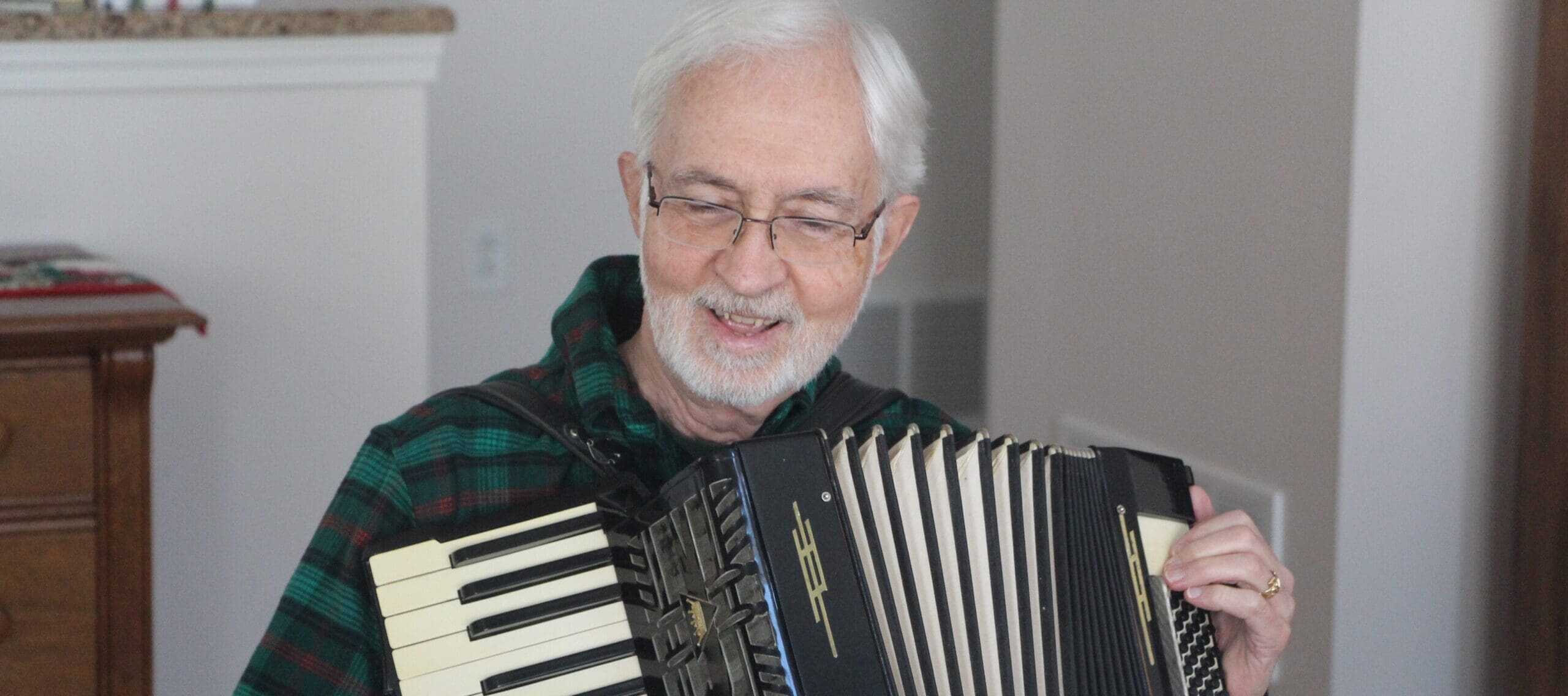“Think like a wise man but communicate in the language of the people,” –Irish poet William Butler Yeats
Rick Muir did not become a music teacher—at least in a traditional sense—until later in life. Yet, once a year he found himself breaking out his favorite instrument to establish common ground with his students. “I taught kids from all over the world who were desperate to learn the language,” says Rick of his days with the Rochester City School District teaching English to speakers of other languages. “I found one of the best ways to teach English was by generating little music books of Christmas tunes for them.” Rick would play the songs on his accordion while students sung along. “Being able to read the words and sing them at the same time really accelerated their learning process. Music was a real motivation for them.”
Despite not being his primary form of income throughout his career, music still managed to have a profound influence in Rick’s life. He attributes that influence to his parents, particularly his mother. Every Saturday morning, she would take Rick and his three siblings to Eastman School of Music’s preparatory school for piano lessons and music theory classes. Later on when Rick entered high school, he branched out and took up the trombone. “I lucked out because I ended up being a student of Emory Remington, probably the world’s most famous trombone professor,” says Rick.
While his mother was the one who encouraged his musical training at a young age, it was his father’s piano accordion that eventually became Rick’s instrument of choice. A physician practicing in the Rochester area, his dad purchased the accordion from a city music store around the time Rick was born. A patient of his began training him on the accordion, but then went off to fight during the Second World War. “Unfortunately, the patient never returned from Europe,” says Rick. “That really discouraged dad and he decided to put the accordion away and never returned to it.” Once in his twenties, Rick picked the accordion up and has been playing it ever since.
Interestingly enough, Rick admits he has never enjoyed playing in front of crowds. “Performance has never been my strong suit,” he says, citing nerves. However, for almost five decades, Rick has been a vital part of Western New York’s Irish, Scottish, and Gaelic music scene in just about every other way. As proof of his influence, Rick was recently one of five inductees into the Rochester branch of the Comhaltas Ceoltóirí Éireann Hall of Fame. The ceremony was held in the Wintergarden at Brickstone by St. John’s on December 15, 2018.
Rick was named chairman of the Beach and Port subcommittee of the Charlotte Business Association. He used his skills as an organizer to get in touch with his various contacts to schedule free events at the beach and the surrounding area. One event became a big hit: the first annual Gaelic Gathering at Ontario Beach State Park in 1976. “We kept that sucker going for a dozen years,” Rick proudly says about the event featuring Irish, Scottish, and Welsh dancing and music. “It was great fun.”
When Rick retired from his day job (he also taught elementary school in the Leroy and Greece Central School Districts before his time with the Rochester City School District) he was asked by local music legend Ted McGraw to lead learning sessions—group jam sessions featuring musicians at various skill levels. Rick agreed, and became a fixture at Johnny’s Irish Pub as an instructor of Celtic music learning sessions for the next decade. He helped a generation of musicians get up to speed with their playing and prepare them to perform at dances and other events.
During his time leading learning sessions, Rick also generated seven music books of Irish and Scottish tunes, making them available to local musicians. One of the books—The Trad Sails On—features over two hundred of his own compositions. He has also created collections of other musician’s tunes, helping the music live on for generations to come.
Because of Rick’s status as a Brickstone resident, the use of the Wintergarden as a venue for the Hall of Fame induction came at no cost. The perk is just one of the many reasons Rick and his wife Margaret—whom he met during an Irish music session in 1981—enjoy living here so much. Rick and Margaret—a retired nurse practitioner—have found many of their peers in education and medicine also reside in the community. “By no means have we met all of the residents living here,” says Rick. “But the ones we have met we are nuts about.”
Not long ago, Rick once again had the itch to help other musicians ply their craft. As a result, he began leading what he calls “combined learning sessions” once-a-month. “Learners bring tunes they have been playing, and we play them a little faster,” says Rick, who also notes that he started the sessions because he himself missed playing. “We go around the circle and play each person’s tune. There is minimal stress.”
These days, Rick’s sessions take place just steps away from his bungalow at Brickstone. He calls the Wintergarden “a great venue that everyone loves to play in.” As he helps mold the next generation of Irish musicians be the best they can be, another Yeats quote seems applicable to Rick’s continuing ability to motivate students: “Education is not the filling of a pail, but rather the lighting of a fire.”

